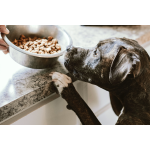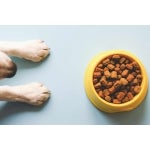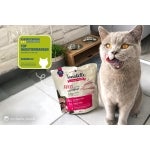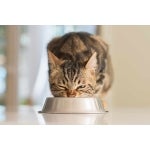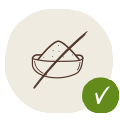

Newborn puppies are special in many ways. Their digestion is very different from that of adult dogs and other animal species. It is therefore crucial that they are fed a species-appropriate diet.
Why should newborn puppies only consume bitch's milk?
Shortly after birth, puppies have a poorly developed digestive tract that is not yet fully functional and have few energy reserves to fall back on. The puppy gradually adapts to nutrients that are not present in the mother dog's milk. A dog cannot process raw starch and carbohydrates such as household sugar shortly after birth.
A mother dog's milk is specially adapted to these needs and represents the optimum nutrition for the puppy. Its nutritional composition differs significantly from the milk of other animal species. The proportion of milk sugar (lactose) is rather low, whereas the proportion of unsaturated fatty acids is significantly higher than in cow's milk, for example.
Supplementary feeding should only be given in the first two to three weeks of the puppy's life in an emergency. For example, if the bitch is not producing enough milk, if individual puppies are being pushed away or if puppies have to be raised without a mother. Due to the specific properties of bitch's milk, it is crucial in such cases to only use suitable replacement milk for puppies and not, for example, to feed milk from another animal species that does not meet the puppies' requirements.
Is there a substitute milk for motherless puppies?
Puppy Milk is a high-quality milk substitute powder that is ideal for motherless rearing of puppies and for a gentle transition from mother's milk to solid food.
Puppy Milk
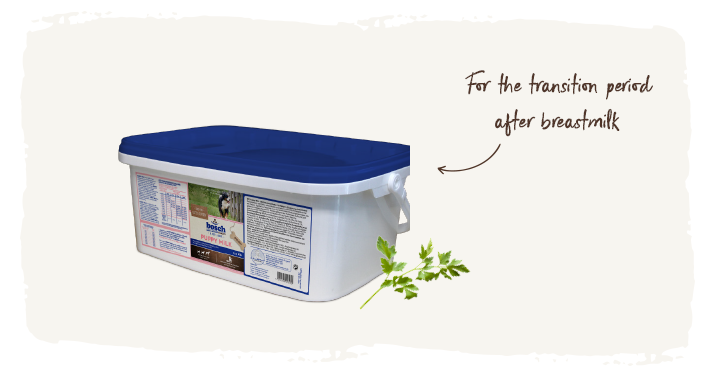

How should I feed the substitute milk?
In order to achieve the nutrient concentration of the puppy milk with Puppy Milk, approx. 1 part Puppy Milk should be stirred into 2 parts water without lumps. The water for mixing the puppy milk should have a temperature of approx. 50°C. Administering cool puppy milk can lead to digestive problems, as the puppies' digestive enzymes work best at body temperature. Of course, the milk should not be too hot either, otherwise the puppies may scald themselves.
As puppies are not yet able to drink from a bowl at first, puppy milk should be given via feeding bottles. The suction opening of the bottle should not be too large so that the puppy cannot choke. A guideline is about one drop of puppy milk per second. The puppy should be fed in a horizontal position so that no milk gets into the windpipe.
To stimulate defecation and urination, the licking of the bitch should be imitated by carefully massaging the abdominal area (loin, stomach, anus) before the meal.
How often should I feed my puppy with replacement milk?
In the first few days of life, especially for puppies of smaller breeds or puppies in poor general health, a feeding frequency of 8 - 12 meals per day is recommended. Depending on the puppy's state of health and vitality, the number of meals per day can be reduced as follows:
- 1st week of life: 6 – 8 meals per day
- 2nd week of life: 5 - 6 meals per day
- 3rd week of life: 4 – 5 meals per day
- 4th week of life: 3 – 4 meals per day
From the third week of life, feeding should be slowly switched from the feeding bottle to the food bowl to get the puppies used to eating additional food. As with normal rearing, puppies can also be accustomed to eating solid food from this period onwards.
What should I bear in mind when feeding a puppy food?
In our special junior recipes, the nutritional components are optimally tailored to the needs of a puppy.
Puppy feed
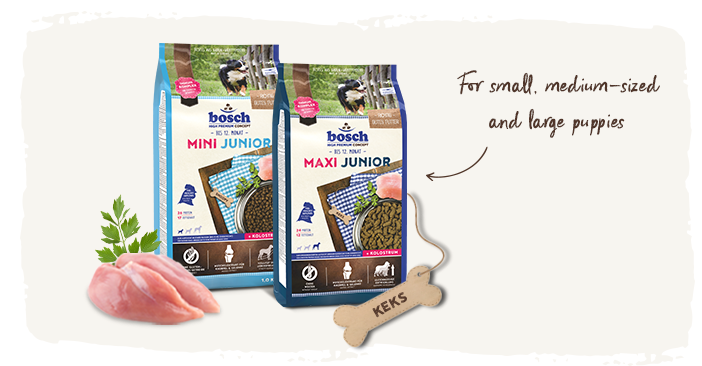

Initially, puppy food should only be offered moistened. The liquid for soaking the puppy food (water or puppy milk) should be warmed up in the first few weeks so that the finished kibble is 36 - 37° C when fed. At the beginning, only a few kibbles should be soaked in the puppy milk and the amount of dry food should then be increased day by day. As the amount of puppy food increases, the puppy milk should be diluted with water. This ensures a particularly gentle transition from milk to food, especially for sensitive litters. To stimulate defecation and urination, a light abdominal massage can also be performed after feeding.
How quickly should a puppy grow and gain weight?
The puppies' development should be monitored by regular weighing and an assessment of their general condition (by a vet if necessary). Healthy and vital puppies should not lose weight. The required continuous weight development in the first weeks of life is guaranteed if the daily weight gain (in g) is 2.5 - 3 times the weight of adult dogs (in kg).
Here is an example: The weight of an adult dog is approx. 30 kg. The daily weight gain of the puppies should therefore be approx. 75 - 90 g in the first 4 weeks.
The following values can be assumed as "intermediate values for weight development":
- By the end of the 1st week: approximately double the birth weight
- By the end of the 2nd week: About 3 - 4 times the birth weight
- Until the end of the 1st month of life: About 6 - 7 times the birth weight
These weights refer to weight gains of puppies that are suckled by the bitch. In the case of motherless rearing, the values given may deviate slightly.
What are the ideal housing conditions for a puppy?
Housing conditions and hygiene also play an important role in the motherless rearing of a puppy.
Cleanliness in the puppies' environment is the top priority, as the additional supply of antibodies can only be ensured via the mother's colostrum. A puppy-friendly microclimate should be created by designing the lying area accordingly.
The following values serve as a guide for the optimum temperature in the puppy's lying area:
- 1st week of life: approx. 30 - 32°C
- 2nd week of life: approx. 28 - 30°C
- 3rd week of life: approx. 26 - 28°C
- 4th week of life: approx. 24 - 26°C
Do you have further questions about raising a puppy without a mother?
Feel free to contact our nutrition experts. They will be happy to help you by e-mail and by telephone via our free hotline.
Phone: +49 (0) 800 333 8 222 (free of charge)
E-Mail: expertenteam@bosch-tiernahrung.de
Monday - Thursday: 7.30 - 12 o'clock & 13 - 16 o'clock
Friday: 7.30 - 12 o'clock & 13 - 15 o'clock


